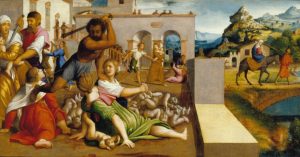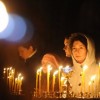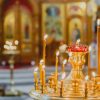For Orthodox Christians, life is the experience of entering ever more deeply into the many and eternal banquets of Christ. The banquet of His love that we feast upon when we discover and convert to Him in our hearts. The banquet of repentance, where the Father makes merry when we return to Him, we prodigal sons and daughters. The banquet of His Holy Body and Blood that is offered to us every Sunday, the Lord’s day—His banquet that we are called to weekly. The banquet of the fasts and feasts of the Church. And the greatest banquet of all! The feast spread out at the table of Christ’s Second Coming when we will enter into the eternal feast of Paradise and when the righteous anger of the Householder will call to account those who rejected His invitation.
As we approach Nativity, the gospel account of the great banquet (Luke 14:16–24) is offered to us as a reminder that we are to be anticipating something profound and mysterious in the birth of Jesus. We prepare our hearts with fasting, for the banquet celebrating the wedding of Divinity to humanity is about to begin. And we are invited! We, the poor, maimed, blind, and lame. We, the inhabitants of the spiritual highways and hedges, the lonely roads and hiding places of this life. We are invited!
St. Athanasius depicts the transformation brought about for us in the Incarnation of Christ.
Having invented wickedness, and involved himself in death and corruption, man went on gradually from bad to worse, not stopping at any one kind of evil but continually devising new kinds of sin. Adulteries and thefts were everywhere, murder and slaughter filled the earth, law was disregarded and all kinds of iniquities were committed. Man was in the process of destruction. Man, who was created in God’s image, was disappearing and the work of God was being undone. Therefore He, the Image of the Father, came and dwelt in our midst, in order that He might renew mankind made after Himself. And now, all the disciples of Christ despise death and take offense at it rather than fear it. By the sign of the cross and by faith in Christ, they trample it underfoot as if nothing. And the devil of old, who exulted in death, it is now he alone who remains truly dead. (On the Incarnation, pp. 41 – 57).
If only we can enter into this reality for a just little while! That our soul can taste something otherworldly and desire it. The curse of the Fall has been transformed. The flaming sword of the angel that guards the Tree of Life has been sheathed and the gates of Paradise reopened to all. Let us do all we can to set aside worldliness, and meditate on these things and pray, even for just a little while. The spirit of the Nativity fast does not even demand from us an eternal spiritual attentiveness, but for only forty days; and the fast is already half over.
We can do this! Let us set aside distractions, and the worldly things that we cling to, in order to take a little peaceful time alone and prepare our hearts for Nativity. Take five minutes. Go somewhere alone, undistracted and peaceful, and ask yourself: Why does God love me so much that He sent his Divine Son, the Creator, to endure everything a fallen human suffers, to accept an unjust and humiliating death, to be murdered, in order to allow me, with all my sins and all my false gods, to become immortal, eternal, like Him? Why?
St. Maximos the Confessors give us a hint as to the answer:
Jesus the Christ who was born in the flesh once for all of us, desires to be born again in the spirit in those who desire Him. In each of us, he again becomes a child in the womb of our soul and forms himself from the virtues. He reveals as much of Himself as He knows each of us can accept. Let us contemplate the mystery of the incarnation and in simplicity praise Him who became man for us. Faith alone can embrace these mysteries, for it is faith that makes real for us things that are beyond intellect and reason. (Philokalia, Vol. 2, p. 165)
Christ is born! Glorify Him!



















